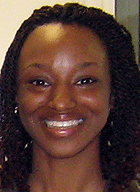Several student groups and administrators at the School of Medicine and residents at Barnes-Jewish Hospital have collected nearly 500 medical textbooks to help their counterparts in Ethiopia.

The textbooks will replace outdated books at the medical school at Ethiopia’s Addis Ababa University, the main teaching hospital in the country’s capital city.
Rahel Nardos, M.D., a native of Ethiopia who recently completed a residency in obstetrics and gynecology at Barnes-Jewish, spent a week working in Addis Ababa University’s hospital last year. As she talked with residents there, she noticed that they used photocopies of outdated material instead of textbooks.
Nardos asked if they would be interested in newer textbooks, and her idea was born.
“It’s such a simple thing and doesn’t ask too much of people,” Nardos said. “People here liked the idea because they know that the books would be well-used and appreciated. The students there are smart and want to practice medicine the right way.”
Nardos reached out for help from her husband, Damien Fair, a fourth-year doctoral student in neuroscience and a member of the Division of Biology and Biomedical Sciences’ Association of Black Biomedical Graduate Students (ABBGS), which quickly became a co-sponsor of the effort along with the Center for Diversity and Cultural Competence at Barnes-Jewish Hospital, the Chancellor’s Graduate Fellowship Program, the Office of Diversity Programs and the Bar Italia restaurant.
“We already had the passion and the brainpower,” said Tracy F. Nicholson, a fourth-year doctoral student in molecular microbiology and an ABBGS member. “We just had to get it going.”
Over several weeks and through a party at Ethiopian-owned Bar Italia, medical students, residents, graduate students and faculty donated their used books published since 2000 at several drop sites, including the Barnes & Noble Bookstore on the medical school’s campus.
The group also collected about $2,800 to ship the books to Addis Ababa, including cash from the Office of Student Affairs and the Office of Diversity.
The UPS store in the Central West End pitched in by packing the books in cartons and donating shipping materials and a portion of the shipping costs.
The Center for Diversity and Cultural Competence at Barnes-Jewish Hospital accepted donations for the effort.
“It was a good cause to collect books for a library in a country that really needs the support we could offer them,” said Brenda Battle, director of the center. “I knew it would enable a lot of people to participate and dovetail with the work Washington University and Barnes-Jewish are doing to promote diversity.”
Also helping out was Rochelle Smith, manager of Diversity Programs and Community Outreach in the Division of Biology and Biomedical Sciences (DBBS), which provides financial support for ABBGS.
“Although they had a limited budget, they have a passion for philanthropy and wanted to do something with a big impact and help as many people as they could,” Smith said.
A few days after the books were packed into 24 cartons and were ready to ship, U.S. postage rates changed and nearly doubled the $2,100 the students had budgeted for shipping. Although about two-thirds of the books have been shipped to date, the remainder must wait until the group raises at least $2,000 or finds alternative sources of getting the books to Ethiopia.
The group is still accepting donations through the Center for Diversity and Cultural Competence.
Nardos and Fair have headed to Addis Ababa University for her one-year fellowship in obstetrics and gynecology. She said she and Fair will be there to receive the remaining books and see firsthand the books making a difference.